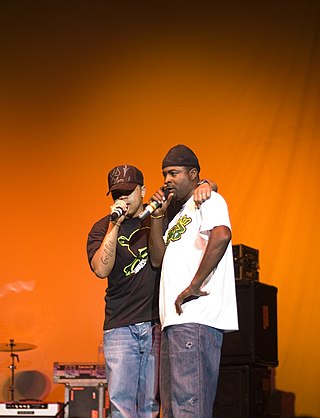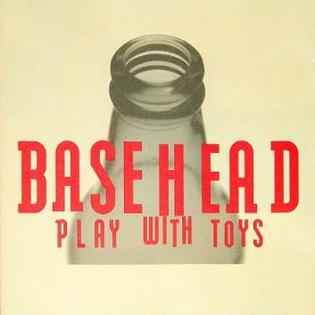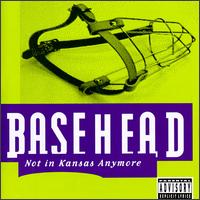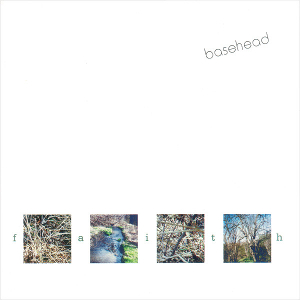
Contemporary Christian music (CCM), also known as Christian pop, and occasionally inspirational music, is a genre of modern popular music, and an aspect of Christian media, which is lyrically focused on matters related to the Christian faith and stylistically rooted in Christian music. Originating in the United States, it was formed by those affected by the 1960s Jesus movement revival who began to express themselves in other styles of popular music, beyond the church music of hymns, gospel and Southern gospel music that was prevalent in the church at the time. Initially referred to as Jesus music, today, the term is typically used to refer to pop, but also includes rock, alternative rock, hip hop, metal, contemporary worship, punk, hardcore punk, Latin, electronic dance music, R&B-influenced gospel, and country styles.

DC Talk is a Christian rap and rock trio. The group was formed at Liberty University in Lynchburg, Virginia in 1987 by Toby McKeehan, Michael Tait, and Kevin Max Smith. They released five major studio albums together: dc Talk (1989), Nu Thang (1990), Free at Last (1992), Jesus Freak (1995), and Supernatural (1998). In 2002, the Encyclopedia of Contemporary Christian Music called dc Talk "the most popular overtly Christian act of all time."

Jesus Freak is the fourth studio album by the American Christian rap and rock trio DC Talk, released on November 21, 1995, on ForeFront Records. The style was a marked departure from the group's previous releases, incorporating a heavier rock sound and elements of grunge that was popular at the time.
Christian hip hop is a cross-genre of contemporary Christian music and hip hop music. It emerged from urban contemporary music and Christian media in the United States during the 1980s.

Rap metal is a fusion genre that combines hip hop with heavy metal. It usually consists of heavy metal guitar riffs, funk metal elements, rapped vocals and sometimes turntables.

John Reuben is an American Christian hip hop artist signed to Gotee Records until late 2010. Reuben has sold over 200,000 copies of his first four albums. He released his sixth album, Sex, Drugs and Self-Control on December 22, 2009. The album was nominated for a Dove Award for Rap/Hip-Hop Album of the Year at the 42nd GMA Dove Awards, while the song "No Be Nah" was nominated for Rap/Hip-Hop Recorded Song of the Year.

Lecrae Devaughn Moore is an American Christian rapper, singer, songwriter, record producer, record executive, and actor. To date, he has released ten studio albums and three mixtapes as a solo artist, and has released three studio albums, a remix album, one EP, and numerous singles as the leader of the hip hop group 116 Clique.

The Bliss Album...? is the second studio album by American hip hop duo P.M. Dawn. It was released on March 23, 1993, by Gee Street and Island Records. Although some critics considered it less successful than the duo's first record, The Bliss Album...? received positive reviews and produced two hit singles—"I'd Die Without You" and "Looking Through Patient Eyes". It was voted the 12th best album of 1993 in The Village Voice's annual Pazz & Jop critics poll.

"Jesus Freak" is a song by the American contemporary Christian music group DC Talk. Released on August 1, 1995, it was the lead radio single from the group's fourth album. The song was written and produced by Toby McKeehan and Mark Heimermann. Lyrically, the song is about standing up for the belief in Jesus Christ in the midst of persecution. Musically, the song has been described as alternative rock and grunge. It received airplay on both contemporary Christian music and alternative rock stations, formats that rarely interact. "Jesus Freak" earned DC Talk three GMA Dove Awards.

Grits is a Christian hip hop group from Nashville, Tennessee. Their name is an acronym, which stands for "Grammatical Revolution In the Spirit". GRITS is made up of Stacey "Coffee" Jones and Teron "Bonafide" Carter, both of whom were DC Talk dancers.

Christopher Scott Greenwood, known by his stage name Manafest, is a Canadian Christian rapper and rock artist from Pickering, Ontario. He has won multiple awards for the GMA Canada Covenant Awards, GMA Dove Awards, and has been nominated for multiple Juno Awards. Signed for a decade with BEC Recordings, Manafest became independent in 2015.

Play with Toys is the debut album by American alternative hip hop group Basehead. It was voted one of the top 50 albums of 1992 in Q magazine, and listed as number 43 in NME's top albums of 1992.

Not in Kansas Anymore is the second album by the group Basehead, released in 1993 via Imago.
"Jesus Is Just Alright" is a gospel song written by American singer Art Reynolds and first recorded by Reynolds' group, The Art Reynolds Singers, for their 1966 album, Tellin' It Like It Is.
William Lee Barefield III, better known by his stage name Trip Lee, is an American Christian rapper and singer. Signed to Reach Records, he has recorded both as a solo artist and as a founding member of the 116 Clique. Originally from Dallas, Texas, he served as a young adult pastor at Concord Church until 2021. His third album, Between Two Worlds (2010), was nominated for two Dove Awards and won the Stellar Award for Best Hip Hop Album in 2011.

"Night of the Living Baseheads" is the third single released in 1988 by hip hop group Public Enemy, from their critically acclaimed album It Takes a Nation of Millions to Hold Us Back. The lyrics deal with the effects of crack cocaine on African-Americans during the 1980s crack epidemic, referring to the slang for freebase cocaine "base" or crack cocaine. The song reached #62 on the U.S. Hot R&B/Hip-Hop Singles & Tracks.
Alternative hip hop is a subgenre of hip hop music that encompasses a wide range of styles that are not typically identified as mainstream. AllMusic defines it as comprising "hip hop groups that refuse to conform to any of the traditional stereotypes of rap, such as gangsta, bass, hardcore, and party rap. Instead, they blur genres drawing equally from funk and pop/rock, as well as jazz, soul, reggae, and even folk."
The Cross Movement was a Christian hip hop group from Philadelphia, Pennsylvania.
"Selah" is a song by American rapper Kanye West from his ninth studio album, Jesus Is King (2019). The song contains additional vocals from Ant Clemons, BongoByTheWay, and the Sunday Service Choir. West co-wrote it with 11 others, while Jeffrey LaValley received songwriting credit due to the song sampling a rendition of the New Jerusalem Choir's work. A hip hop and gospel song, it instrumentally relies on military drums. The song includes samples of the Sunday Service Choir's rendition of "Revelations 19:1". Lyrically, it sees West asserting his Christian faith and referencing Bible verses. The song had originally been slated for release on Yandhi in November 2018 until the album was scrapped, though it later leaked the following year.

Faith is the third album by the American hip hop group Basehead, released in 1996. The release was delayed for two years as Imago Records separated from BMG. It was the group's last album for the label.














